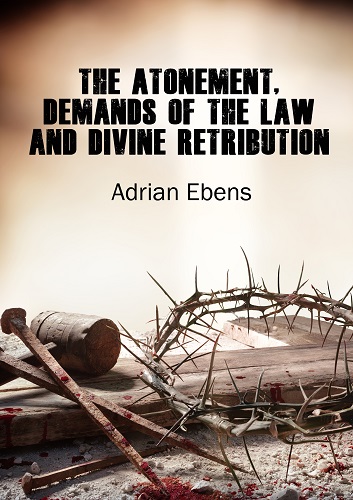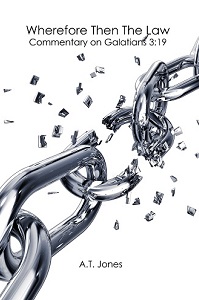Mrs. White is All Law, Law!
"Mrs. White is all law, law; she believes that we must be saved by the law, and no one can be saved unless they keep the law."
This accusation was made against her in her day and is being touted again today, even among some Adventist circles. We allow her to answer the charges in her own words from an article entitled, Incidents on the Voyage to the North Pacific, which appeared in the July 18, 1878 issue of Signs of the Times. (Frank Klin)
"We left San Francisco June 10, in the steamer Oregon for Portland...There were several ministers on board who, like ourselves, were going to Oregon to hold meetings, by request. Among them was Elder Brown, with his family, who has been speaking in San Francisco and Santa Rosa. I had distributed some of our publications among the passengers. In the evening I was lying in my state-room, the door of which opened upon the upper deck. I heard the elder stating to a company gathered about him that it was impossible for any man to keep the law of God; that man never did keep it, and never can keep it. Said he, "No man will get to heaven by keeping the law. Mrs. White is all law, law; she believes that we must be saved by the law, and no one can be saved unless they keep the law. Now I believe in Christ. He is my Saviour, Christ alone can save us, and without him we cannot be saved."
I felt the injustice of the charge made against me, and could not permit such a statement, made before quite a gathering of people, to remain uncorrected. I accordingly said, "That is a false statement. Mrs. White has never occupied that position. I will speak for myself and for our people. We have always taken the position that there was no power in the law to save a single transgressor of that law. The law convicts and condemns the sinner, but it is not in its province to pardon the least or greatest sin. If we sin we have an Advocate with the Father, Jesus Christ the righteous. The sinner gets into trouble with the Father through transgression of his law. Christ, the sinner's Advocate, pleads in his behalf. The law cannot release the sinner from the consequence of his transgression, but Christ himself pays the penalty the sinner has incurred by his disobedience.
"The apostle Paul inquires, 'Shall we continue in sin that grace may abound? God forbid.' Shall we presume upon the mercy of Christ by living in transgression of the law of God? Paul declares to the elders of the church, 'I kept back nothing that was profitable unto you, but have taught you publicly, and from house to house, testifying both to the Jews and also to the Greeks, repentance towards God, and faith toward our Lord Jesus Christ.' Repentance toward God because of his law transgressed, and faith toward our Lord Jesus Christ, as the sinner's Advocate. Said Paul, 'What shall we say then? Is the law sin? God forbid. Nay, I had not known sin but by the law, for I had not known lust except the law had said, Thou shalt not covet.' Again Paul sums up the matter: 'Wherefore the law is holy, and the commandment holy and just and good.'
"Christ did not come to excuse sin, nor to justify a sinner while he continued to transgress that law for which the Son of God was to give his life to vindicate and exalt. Had it been possible for the law to be repealed, Christ would have had no need to come to our earth, and to die, the just for the unjust. God could have taken the sinner back into favor by annulling the law. But this could not be. The law holds the transgressor in bondage, but the obedient are free. The law cannot cleanse from sin, it condemns the sinner. The sinner may stand justified before God only through repentance toward him, and faith in the merits of Jesus Christ. The law is a great mirror by means of which the sinner may discern the defects in his moral character. But the mirror cannot remove those defects. The gospel points to Christ as the only one able to remove the stains of sin by his blood. Though the law has no pardoning power, it is the only means by which to explain to the sinner what sin really is. By the law is the knowledge of sin. Without the law, Paul tells us sin is dead.
"It is folly to bid the sinner come to Christ before being convicted of his sin by being brought before the mirror of the law of God. What is the sinner to be converted from? The transgression of God's law to obedience of it. But if he is told that he cannot keep the law of God, and that if he should attempt it he would be brought into bondage, to what is he then converted,--transgression of the law to a continuance in that transgression? This is absurd. Yet professed ministers of Christ tell the sinner that he is guiltless while disloyal to the law of God. Such conversions are not ratified in heaven.
"Our Christ was the Saviour of the ancient worthies as much as he is our Saviour. They looked forward by faith, to a Saviour to come. Adam was saved by the gospel as virtually as we are saved today. Abraham was saved by faith in Christ as the Lamb of God who taketh away the sins of the world. Moses was saved by the merits of Christ, who was the angel that led the armies of Israel in all their travels through the wilderness. God commanded, 'Provoke him not, for he will not pardon your transgressions, for my name is in him,' All who have died in faith, from righteous Abel unto our day are saved by the merits of Jesus Christ.
"Jesus said: 'Not every one that saith unto me, Lord, Lord, shall enter into the kingdom of heaven; but he that doeth the will of my Father which is in heaven. Many will say to me in that day, Lord, Lord, have we not prophesied in thy name? and in thy name have cast out devils? and in thy name done many wonderful works? And then will I profess unto them, I never knew you; depart from me ye that work iniquity.' How many there are who cry Christ, Christ, only believe on Christ, when they do not the works of Christ. Such are represented by the class mentioned by our Saviour as workers of iniquity. They transgress the law of God, and by precept and example teach others to do likewise. Nominal profession of faith in Christ will not save a soul; neither will nominal observance of the law. The law of God must be obeyed from the heart; its principles must be carried out in the life; and faith in Jesus Christ as the world's Redeemer must be manifested in the life and character, or there is no true conversion.
"The law of God is changeless in its character as the eternal throne. The types and shadows reached to the antitype and substance, Jesus Christ. At his death they ceased to have any force or significance. But the law of the ten commandments, instituted in Eden, when the foundation of the world was laid, when the morning stars sang together, and the sons of God shouted for joy, was to be as enduring as the heavens and the earth. Christ pronounced his benediction upon all who keep sacred the law of God: 'Blessed are they that do his commandments, that they may have right to the tree of life, and may enter in through the gates into the city.
"Elder Brown, please never again make the misstatement that we do not rely on Jesus Christ for salvation, but trust in the law to be saved. We have never written one word to that effect, nor taught such a theory in any manner. We believe that no sinner can be saved in his sins (and sin is the transgression of the law), while you teach that the sinner may be saved while knowingly transgressing the law of God."
"Well," said Elder Brown, in a low voice, to those collected about him, "I know all about them." I felt called upon to reply to this, and said. "Sir, if you know all about the position that we, as a people, occupy, you must also know that you have misrepresented us. We have never intimated, either in sermons preached by our ministers, or in the thousands of pages of our printed matter scattered all over the world, that there is any power in the law to save the sinner. On the contrary, it has been repeated again and again by our speakers and writers that the law has no power to redeem the transgressor from the consequences of his sin. We will speak at our approaching camp-meeting in Salem. Please come up, and learn what we really do believe, for it is evident that you are not acquainted with us or our faith."
I will here state that Elder Brown, while in San Francisco, said that he had known Mrs. White in the East--knew all about her, leaving an impression on the minds of those whom he addressed unfavorable to me and my work. I have no knowledge of ever having seen this man or of having a moment's conversation with him, previous to the voyage on the Oregon. I have no evidence that he ever heard me speak, or that he has ever read my writings, or acquainted himself with my mission. The truth undoubtedly is he is entirely ignorant concerning Mrs. White and her labors. Many have thus professed to be thoroughly acquainted with me whom I have never seen nor spoken with. They have gathered up the hearsays, and evil reports floating from false and slanderous tongues, and deal them out as facts which they know to be true.
I was astonished at the position taken by Elder Brown on the question of the law. It seemed incredible that one who professed to be a Bible student, and teacher, should affirm that no man ever kept the law of God, or could keep it. This is the fearful position taken by many ministers, in order to get rid of the Sabbath of the fourth commandment. Such teachers throw a very unfavorable light upon the character of our heavenly Father, when they represent him as giving men a code of laws which is the foundation of all civilized national and domestic government, yet which it is impossible that men ever have or ever can obey. Such sentiments expressed by public teachers lead men, not only to disregard the divine law, but to trample upon it as an arbitrary requirement which they are justified in rebelling against. The teachers of such pernicious doctrines will not be in an enviable position when they shall meet the great Lawgiver over his broken law.
Wherein would man be happier even in this life if he should have perfect liberty to break the ten precepts of the Father's law? God, in his great love for man gave him that law by which to order his conduct, that he should be restricted to doing those things which would tend, to increase his real happiness, and that of his fellow creatures even in this life. The principles of the commandments, carried out in the daily life ennoble and sanctify the heart and mind and give one a moral fitness through Jesus Christ, for the society of holy angels. Our all wise heavenly Father knew what rules were required to guard man from sin and to regulate his life, leading him to practice such virtues as would make him a fit subject for heaven.
Christ said, "If ye keep my commandments ye shall abide in my love, even as I have kept my Father's commandments, and abide in his love." Christ should be our example in all things. He came from the realms of glory, not to show man a way by which he could be saved in transgression of the law, by which transgression Adam fell. But he took upon himself human nature, passed triumphantly over the ground where Adam stumbled, and redeemed that failure by his own perfect obedience of the law, and resistance to the temptations of Satan, which had compassed the fall of Adam. Christ in his own life has given us a proof that man can keep the law of God, and, through his merits be a final overcomer.
In his sermon on the mount Christ said, "Think not that I am come to destroy the law, or the prophets; I am not come to destroy, but to fulfill. For verily I say unto you, Till heaven and earth pass, one jot or one tittle shall in nowise pass from the law, till all be fulfilled. Whosoever therefore shall break one of these least commandments and shall teach men so, he shall be called the least in the kingdom of heaven; but whosoever shall do and teach them, the same shall be called great in the kingdom of heaven." Christ here shows the object of his mission: To show man by his example, that he could be entirely obedient to the moral law, and regulate his life by its precepts. That law was exalted and made honorable by Jesus Christ.
Should the pope of Rome and all the inhabitants of the earth unite their intellect for the purpose, they would not abolish the smallest claim of the law spoken from Sinai. God has specified his will toward man in his ten precepts. It is as perpetual and unchangeable as his character. The law says to every transgressor, Thou shalt surely die. But Christ says to every soul that repents toward God for his transgression of the law, and turns in penitence to his Saviour, Thou shalt as surely be saved as that Christ died for the salvation of men.
What solemn words were those that fell from the lips of the divine Teacher, who came to make honorable the law of his Father: "Whosoever shall break one of these least commandments, and shall teach men so, he shall be called the least in the kingdom of heaven." Ministers and people should comprehend the full significance of these words. Those who by word or action, or interpretation of Scripture, lessen, or explain away the sacred claims and dignity of God's holy law shall have no place in the kingdom of heaven. Christ would here have us understand that our righteousness must include, not only the observance of the letter of the law, but also the spirit and principle of it. The letter of the law specifies how we must walk in order to please God; the spirit of the law points to Jesus Christ as the atoning sacrifice, through whose merits the sinner can fulfill the requirements of the law, Christ said, "I and my Father are one." There is therefore perfect harmony between the law and the gospel."





